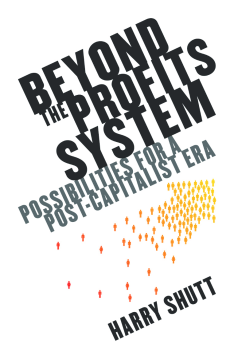
Additional Information
Book Details
Abstract
Since 2008, we have found ourselves confronted by an historic financial holocaust that world leaders have struggled to come to terms with. All have willfully ignored its long-term, systemic causes and are thus unable to chart a way to survival. As explained by Harry Shutt - who was almost alone in foreseeing such a disaster in the 1990s (in The Trouble with Capitalism) their continued denial stems from a vested interest in maintaining a capitalist profits system which is not only as destructive as it was in the 1930s but as outmoded as feudalism was in 1789. Thus it can now only be sustained by an increasing reliance to official misinformation, massive criminal fraud and the ever greater dependence of private corporations on state subsidy.
This book makes clear why the desperate resort of Western governments to 'extraordinary measures' to try and avert economic collapse is bound to fail. It also forcefully demonstrates why our only hope of reversing the tide is to abandon the traditional economic logic of endlessly expanding production in favour of responding to the aspirations of ordinary people. Such a transformation, argues Shutt, would make possible the allocation of resources to more socially desirable ends, including the assurance of basic economic security for all as a right of citizenship.
Harry Shutt was Chief Economist at the Fund for Research and Investment for the Development of Africa (1977-79). Since then he has been an independent economic consultant. His books include The Myth of Free Trade: Patterns of Protectionism Since 1945 (1985), The Trouble with Capitalism: An Inquiry into the Causes of Global Economic Failure (Zed 1999), A New Democracy: Alternatives to a Bankrupt World Order (Zed 2001) and The Decline of Capitalism: Can a Self-Regulated Profits System Survive (Zed 2004).
'This has been the most interesting discussion with an economist I have ever had in my life.'
George Galloway, Press TV
Table of Contents
| Section Title | Page | Action | Price |
|---|---|---|---|
| About the author | ii | ||
| Introduction | 1 | ||
| 1 Anatomy of a crisis | 5 | ||
| The roots of disaster | 9 | ||
| Speculative folly | 14 | ||
| The descent into criminality | 20 | ||
| The political nexus | 24 | ||
| Continuing denial | 24 | ||
| The post-millennium bubble – a terminal orgy? | 26 | ||
| A humanitarian crisis | 27 | ||
| 2 The official response: a study in delusion | 31 | ||
| The first priority: bailing out the banks | 34 | ||
| Reflation of the bubble: a final throw of the dice | 37 | ||
| Market manipulation: the imperfectly hidden hand | 38 | ||
| The fraud of official statistics | 41 | ||
| Still cooking the books | 43 | ||
| Going for broke | 46 | ||
| Silence of the dissidents | 47 | ||
| 3 Facing up to systemic failure | 49 | ||
| Poor prospects for long-term recovery | 51 | ||
| Resistance to devaluation of capital and labour | 56 | ||
| The need to abandon the growth obsession | 59 | ||
| Excess population growth – the undeclared menace | 62 | ||
| 4 The price of profit-driven growth | 65 | ||
| The privatisation catastrophe | 65 | ||
| Forcing enterprises to service surplus capital | 69 | ||
| The private pensions vampire | 71 | ||
| Wasteful and costly over-investment | 73 | ||
| Profit-distorted priorities | 76 | ||
| Encouragement to speculation through liberalisation of markets | 83 | ||
| The ‘war’ on drugs: a profit-driven perversion of public policy | 87 | ||
| A pattern of resource misallocation | 91 | ||
| 5 A new model: ending the tyranny of production | 93 | ||
| Origins of the expansionist bias | 94 | ||
| The work fetish | 99 | ||
| The new scarcity | 105 | ||
| A more rational ideology | 107 | ||
| 6 Evolving a more rational economic system | 111 | ||
| Basic strategic orientation | 111 | ||
| A more rational globalisation | 112 | ||
| Restoring monetary order | 115 | ||
| The role of enterprise | 116 | ||
| Income distribution and employment | 122 | ||
| Basic income – an idea whose time has come | 124 | ||
| An end to the anarchy of the global ‘free’ market | 127 | ||
| Criteria for public choice | 130 | ||
| 7 Ideology for the twenty-first century: cooperation, creativeness, equality | 133 | ||
| In place of the work ethic | 135 | ||
| Changing perceptions of the corporate sector | 141 | ||
| Marginalising the profit motive | 144 | ||
| Measuring welfare | 146 | ||
| 8 Deepening democracy | 149 | ||
| Ending the power of money over the political process | 150 | ||
| Limiting media distortions | 153 | ||
| Restoring the rule of law | 156 | ||
| Enhancing participation and accountability | 157 | ||
| The measure of democracy | 159 | ||
| Governance in the developing world | 160 | ||
| 9 Capitulation or catastrophe? | 165 | ||
| A glimmer of hope? | 166 | ||
| An emergency response | 169 | ||
| A compulsive hope | 171 | ||
| Index | 175 |
